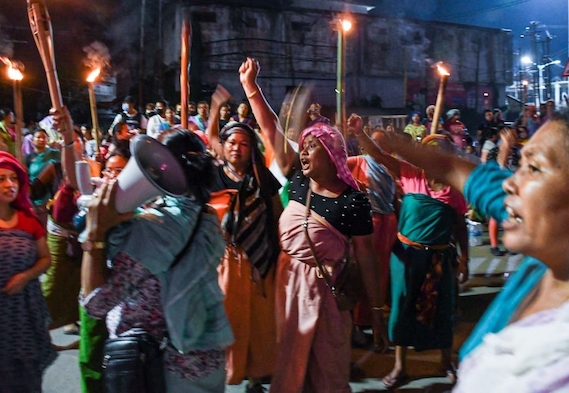In the northeastern Indian state of Manipur, a unique and inspiring movement has been gaining momentum over the years. The movement is characterized by the participation of fearless women known as “Meira Paibi” or “Torch Bearers of Manipur.” These women have played a significant role in Manipur’s history, from their inception to the present day. In this article, we will explore the history and the enduring significance of the Meira Paibi movement in Manipur’s society.
The Origins of Meira Paibis
The Meira Paibi movement traces its roots back to the early 1980s when Manipur was facing political turmoil and civil unrest. The state was marred by violence, human rights abuses, and a lack of accountability. In such a challenging environment, a group of women came forward, determined to bring about change and restore peace to their homeland.
The term “Meira Paibi” itself is symbolic; “Meira” means torch, and “Paibi” means bearer, which implies “Torch Bearer” and even referred to as the “Guardians of Civil Society”. These women chose to wield the torch as a symbol of enlightenment, shedding light on the injustices and atrocities committed in the darkness of the conflict.
Significance of Meira Paibis
- Guardians of Human Rights: Meira Paibis emerged as the guardians of human rights in Manipur. They took it upon themselves to monitor and document human rights violations, including extrajudicial killings, disappearances, and torture. Their vigilance and tireless efforts have drawn international attention to the human rights issues plaguing the state.
- Peace Advocates: These torchbearers have been instrumental in advocating for peace and dialogue amidst the ongoing conflicts in Manipur. They have played a pivotal role in mediating between different factions and pressuring the government for peaceful solutions.
- Social Activism: Beyond their role in conflict resolution, Meira Paibis engage in various social activism initiatives. They work to address issues like drug abuse, alcoholism, and gender-based violence within their communities. Their commitment to social justice extends beyond political conflicts.
- Gender Empowerment: The Meira Paibi movement has been a driving force for gender empowerment in Manipur. These women have shattered traditional gender norms by actively participating in political and social movements, challenging the patriarchy prevalent in the region.
- Grassroots Mobilization: Meira Paibis operate at the grassroots level, making them deeply connected with the local communities. Their ability to mobilize support and organize protests has been pivotal in raising awareness about the issues facing Manipur.
Challenges and Resilience
Despite their admirable work, Meira Paibis have faced numerous challenges over the years. They have often been subjected to threats, harassment, and violence from various quarters, including state actors and insurgent groups. Many Meira Paibi leaders have lost their lives in the line of duty.
However, the Meira Paibi remain resilient. Their commitment to justice and peace continues to inspire generations of Manipuris. They have garnered support not only within Manipur but also from human rights organizations and activists worldwide.
The challenges faced by Meira Paibi have not deterred their resolve. In fact, adversity has only strengthened their determination to bring about positive change. They have continuously adapted their strategies and tactics to navigate the ever-evolving landscape of Manipur’s conflict. Despite the personal risks they face, Meira Paibi leaders have displayed exceptional courage, often putting their lives on the line to protect the rights and dignity of their fellow citizens.
Moreover, Meira Paibis have evolved beyond their initial role as mere torchbearers. They have diversified their efforts and expanded their sphere of influence. Today, they are active in advocating for various social causes, including environmental conservation, education, and healthcare. Their work extends beyond the boundaries of Manipur, as they collaborate with other civil society groups to address regional and national issues.
They have also embraced technology and social media to amplify their voices and draw attention to their causes. They have effectively harnessed the power of the internet to garner support and raise awareness about the issues they champion. In doing so, they have transcended geographical limitations and connected with a global audience sympathetic to their cause.
Conclusion
The Meira Paibi movement in Manipur is a testament to the power of grassroots activism, especially when led by courageous women. These torchbearers have not only illuminated the path to justice and peace in Manipur but have also challenged societal norms and advanced the cause of gender empowerment. As Manipur continues to grapple with complex issues, the Meira Paibis remain steadfast in their commitment to creating a brighter and more just future for their state and its people. Their role in Manipur’s history and society is nothing short of extraordinary, and their impact will undoubtedly be felt for generations to come.
They represent a remarkable story of resilience, courage, and determination. These women, who took up the torch to dispel the darkness of violence and injustice, have become a beacon of hope for Manipur and beyond. Their multifaceted role as human rights defenders, peace advocates, social activists, and champions of gender empowerment is an inspiration to the world.
As Manipur continues its journey towards peace and justice, the Meira Paibis remain at the forefront, unwavering in their commitment to building a better society. Their legacy is a testament to the transformative power of grassroots activism and the indomitable spirit of those who dare to challenge the status quo in pursuit of a more just and equitable world. The Meira Paibis are not just torchbearers of Manipur; they are the guiding light towards a brighter future for us all.


